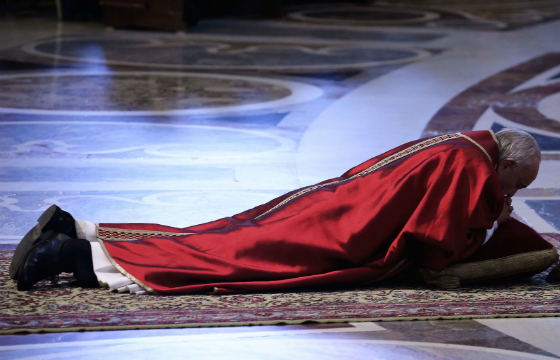The Church has been damaged by bishops, priests and religious who have lost sight of their original vocation, Pope Francis said today during a Stations of the Cross service on Good Friday where the meditations included a strong emphasis on women.
At its conclusion on Friday night, Francis delivered a final prayer where he expressed “shame for all the times that we bishops, priests, consecrated men and women scandalised and hurt your body, the Church”.
The Pope went on: “We have forgotten our first love, our initial enthusiasm and our total availability; leaving rust on our hearts and our consecration,” while praying that “our betrayals” do not undermine “the immensity” of God’s love and mercy.
Francis, who did not cite clerical sexual abuse or any specific scandal involving priests and religious, went on to lament the innocent blood that is paid daily by “women, children, immigrants and people persecuted for the colour of their skin…and for their faith in you”.
The annual Good Friday penitential gathering took place in a lit up Colosseum where a torchlight procession weaved its way around the former Roman gladiator ring which was a place of death for the early Christians. Each year the Pope leads the night-time service in the same place and Francis did so again, sitting bowed in prayer in front of a flaming cross which had been specially erected on a platform above him.
Among those carrying the cross were a group of Egyptians, Hany Mourad Yassa Mosaad and Dina Atef Khalifa Sawers with her three daughter. It was a stark reminder of the terror attacks on two churches in Tanta and Alexandria less than a week ago, on Palm Sunday. Francis is due to visit Egypt later this month.
The 14 stations of the cross are an ancient Christian devotion marking the final stages of Jesus’ life, starting at his condemnation to death and ending with him being placed in the tomb.
Different people from around the world carried the cross between each station with representatives from China, India, Colombia, Africa and the Holy Land among those taking part. The Egyptians carried the cross at the eighth station, the moment when Jesus meets the weeping women of Jerusalem.
Elsewhere in his reflection, Francis recalled those caught up in war zones or migrants fleeing them - “our brothers cut off by violence, indifference and war” - and then asked for a breaking of the “chains” which hold “us prisoners in our selfishness and in our blindness”.
Too often, Francis prayed, “we have sold you and betrayed [you]” been silent in the face of injustice and with a “shrill voice” defended our own interests rather than [yours] while ending up with our feet “paralysed” when trying to walk the path of goodness.
At each of the 14 stations a passage of scripture, prayers and a meditation is read out. Every year the Vatican commissions a special set of reflections and this year, for the first time, they were written by a lay woman: Anne Marie Pelletier, a French biblical scholar and married mother of three.
Her meditations use scripture poetically helping to apply Jesus’ suffering to the problems afflicting contemporary humanity. At the seventh station, when Christ meets the women of Jerusalem distressed by his plight, Pelletier writes of how the “weeping of women is never lacking in this world” and where tears “fall silently on women's cheeks”. Citing those who cry over their children caught up in war, the sick and the dying she references Catherine of Siena and Etty Hillesum, a Dutch writer who resisted Nazism and was later murdered at Auschwitz.
In front of the evil about to engulf the world during that period Hillesum told God “I will try to help”: this, Pelletier says, shows an “audacity so feminine and so divine”!
Earlier in the meditations Pelletier wrote about the “banality of evil” and the “countless men, women, and even children being raped, humiliated, tortured, murdered” but stresses that “Jesus is part of this procession of terrible suffering that man inflicts on man. He knows the abandonment of the humiliated and the most destitute”.




 Loading ...
Loading ...